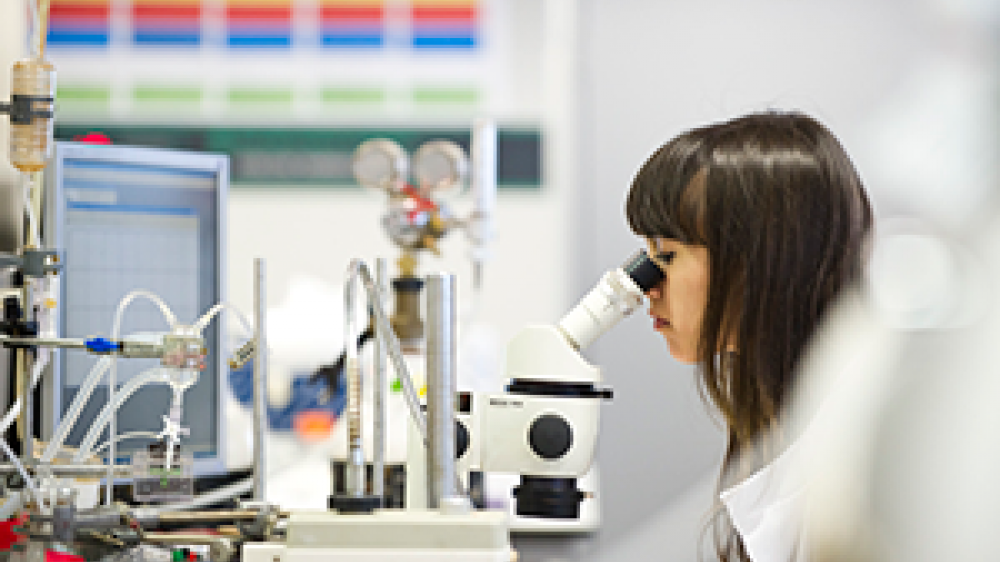Seventeen new PhD studentships announced

We are pleased to announce 17 new awards, totalling £1.53 million, made under our PhD studentship scheme including three awards made jointly with the British Heart Foundation (BHF) to projects focused on achieving 3Rs impacts within the field of cardiovascular research.
This is the largest number of studentships to be awarded since the scheme launched in 2011, taking the total number to 118.
The latest awards will provide early careers researchers with the opportunity to work on projects ranging from developing human-relevant organoid and stem cell-based models of kidney damage, intestinal infection and bone remodelling, through to improving the welfare of monkeys used in neuroscience research by focusing on weaning. Three of the awards are for projects to develop the fruit fly as a model of human disease replacing the use of rodents.
Students on the three projects co-funded with the BHF will develop an in vitro model of human arterial thrombosis as a replacement for existing animal models, a non-animal (in vitro and in silico) approach to predict and prevent deep vein thrombosis, and a method to modify human platelets using liposomes to reduce the use of animals in platelet research.
The awards are made directly to the principal investigators. Interested students should contact the respective supervisors. For full details and how to apply, visit the studentship vacancies page.
Awarded studentships (in alphabetical order):
Professor Melissa Bateson, Newcastle University – ‘Refining weaning age in macaques destined for neuroscience research’
Dr Adrian Biddle, Queen Mary University of London – ‘A 3Rs approach to tumour metastasis: investigating the role of cancer stem cells in metastasis using an in vitro microfluidic model’
Dr Derek Brazil, Queen's University of Belfast – ‘Development of novel models of kidney damage using induced human pluripotent stem cells’
Dr Matthew Child, Imperial College London – ‘Towards multiplexed in vivo phenotypic screening to improve antimicrobial drug discovery’
Dr Steven Clapcote, University of Leeds – ‘Development of an invertebrate model of alternating hemiplegia of childhood’
Dr Marios Georgiou, University of Nottingham – ‘An in vivo genetic screen of lung function candidate genes using tissue specific RNAi in Drosophila melanogaster’
Dr Silvia Gratz, University of Aberdeen – ‘Modelling Candida albicans infection of the human gut using human intestinal organoid cultures’
Professor Jonathan Hardman, University of Nottingham – ‘Replacement of animal models of cardiac arrest and resuscitation strategies using a computer simulation’ (award made under the 2018 highlight notice)
Dr Sarah Jones, Manchester Metropolitan University – ‘Development and characterization of a novel endothelialized in vitro model of human atherothrombosis’ (joint award with the BHF)
Dr Veronique Miron, University of Edinburgh – ‘Reducing number of mice required for drug testing via development of first in vitro automated screening platform of injured mammalian brain’
Dr Amy Naylor, University of Birmingham – ‘An organotypic model of the bone remodelling process’
Dr Daniel Neill, University of Liverpool – ‘Experimental evolution of Pseudomonas aeruginosa in media replicating the conditions of the upper and lower airways’
Dr Alice Pollitt, University of Reading – ‘Fusogenic liposomes: the innovative delivery of compounds into human platelets to reduce animal use in platelet research’ (joint award with the BHF)
Dr Anthony Vernon, King’s College London – ‘Maternal immune activation: advancing from rodents to humans through a development of a hIPSC model to study gene x environment interactions’
Dr Daniele Vigolo, University of Birmingham – ‘Advanced in vitro and in silico models to predict and prevent deep venous thrombosis’ (joint award with the BHF)
Professor Vladyslav Vyazovskiy, University of Oxford – ‘Fasting-induced torpor in mice: effects on sleep and behaviour’
Dr Frances Wiseman, University College London – ‘Replacing Alzheimer's disease (AD) - Down syndrome (DS) mice with fly models’
For more information on the previous awards, including case studies, read our PhD Studentship Review.
